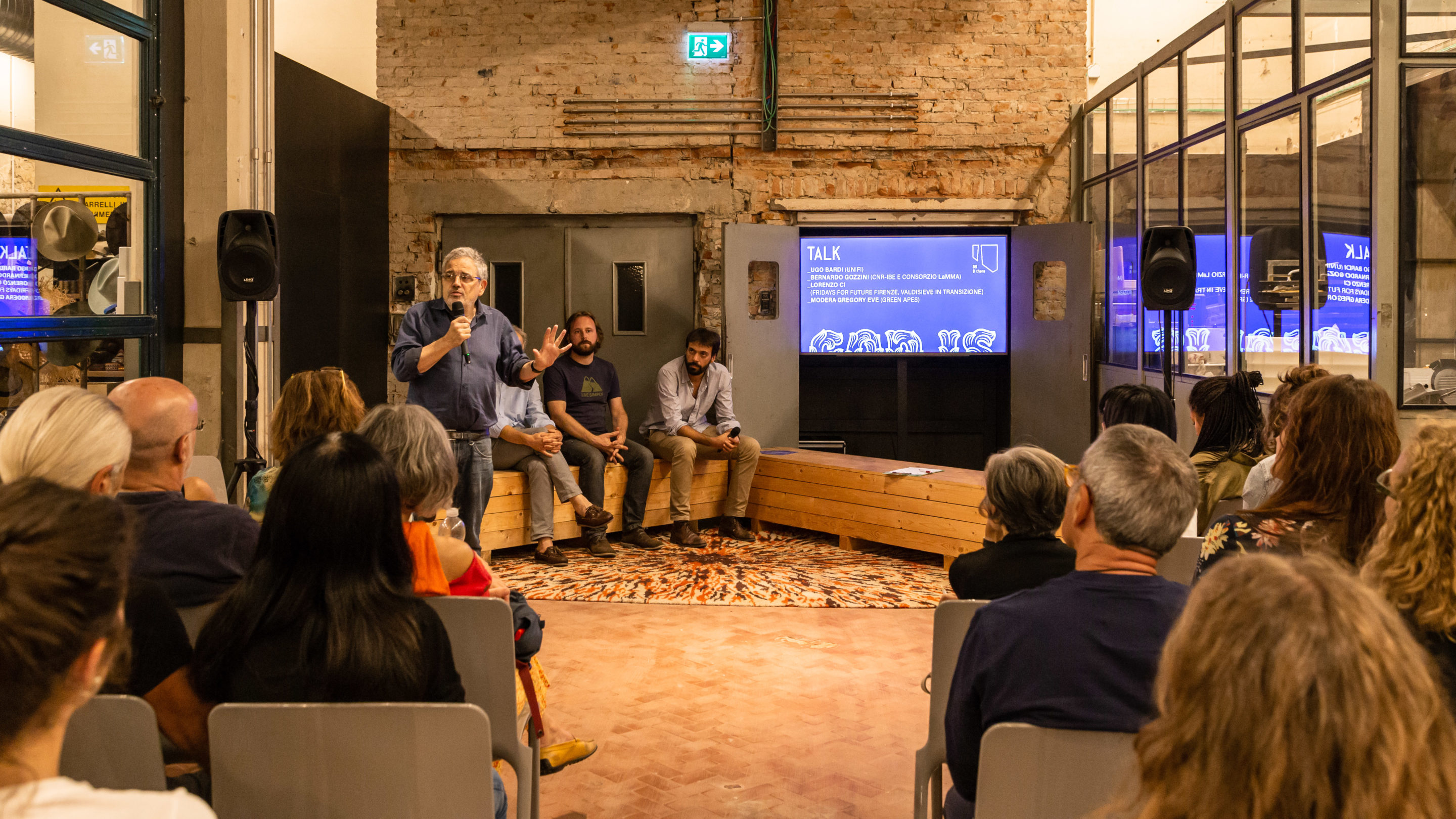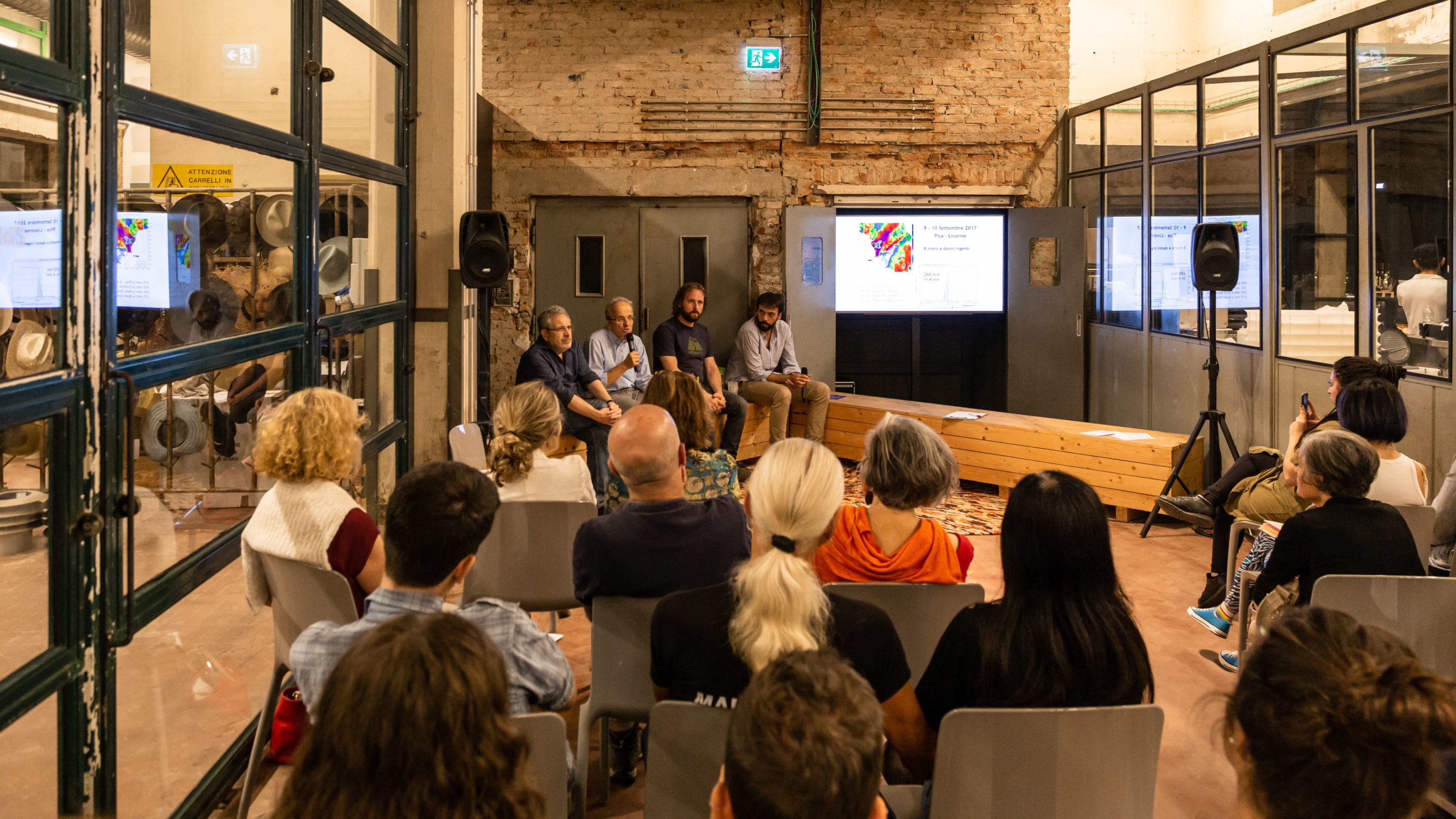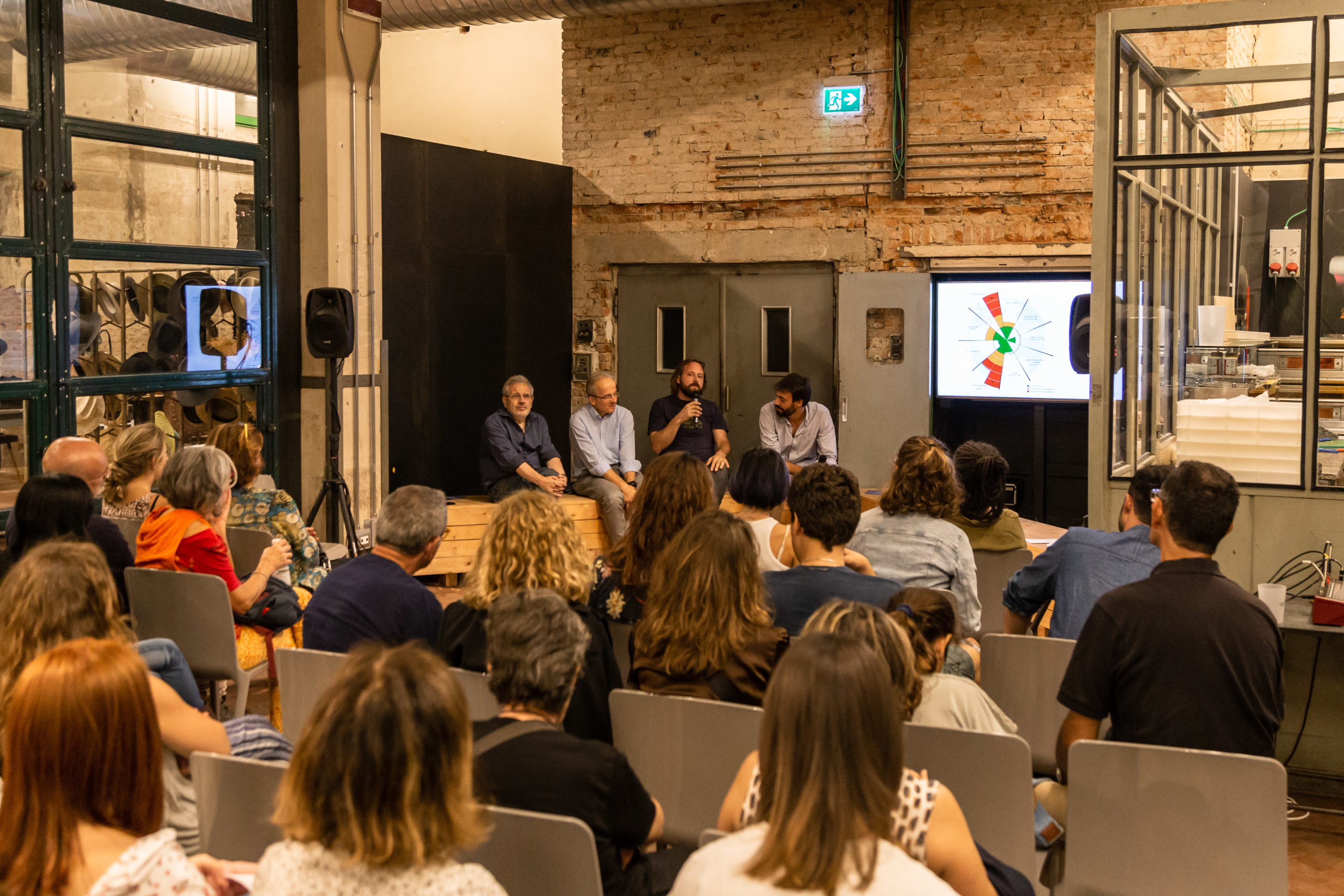Glocal Warming | God is Green talks
With Ugo Bardi (Professor of Chemistry at the University of Florence), Bernardo Gozzini (CNR - Institute of BioEconomics and Sole Administrator of the LaMMA Consortium), Lorenzo Ci (Director and political activist, Fridays for Future Firenze and Valdisieve in Transizione), and Gregory Eve (co-founder of GreenApes).
See the full program
The challenges of climate change, from the global to the local.
At the end of a summer marked out by huge fires in the Arctic and the Amazonian rainforest, it is ever more evident that we need to find concrete solutions to the challenges of climate change. It is a challenge that involves and impacts upon both far away countries and the places where we live.
The talk took place as part of the God is Green festival and touched on the global situation as well as the effects that are already measurable in Tuscany. It looked at possible lines of action that have been proposed for the territory, as a way of feeling part of the solution and not part of the problem.
Gregory Eve is the co-founder of GreenApes, a digital platform that was set up to promote and reward sustainable lifestyles. With the help of his moderation, the talk was able to explore new points of view and unexpected connections between climate change and civil society.
Professor Ugo Bardi of Florence University spoke about the similarities between Hokusai’s The Great Wave off Kanagawa and the current historical period. The artist was able to capture the essence of transformation, in all of its disruptive and irresistible force, he had gone beyond the representation of a simple fact and had painted a concept. The technological, ecosystemic, spiritual, political and economic transformations that are sweeping through humanity represent radical changes that do not allow for opposition. Real solutions are beyond simply changing habits, they are something that will lead to a new society, completely different from the one we know now.

Bernardo Gozzini: “This wave, Professor Bardi, is it something we can ride or should we let it transport us somewhere?”
Ugo Bardi: “We do everything we can, our whole life consists of surfing against the tide.”

Climate change is also something that is happening to the rest of the ecosystem, with the acidification of the oceans as an example.
As Bernardo Gozzini, director of the Lamma consortium, explains, the climatic system is a complex problem, even for a climatologist. The models that are used are not real, they reproduce a simplified reality. What actually happens is down to a dynamic set of many factors, everything that exists on the planet has an influence on the climate, often in an unpredictable way. One of the difficulties is finding the correct way to communicate that the data are interpretations and percentages, and not definitive data, without this detracting from the problem.
“There are a series of effects that are not included in the models, or where we still don’t completely understand the impact they have on the ecosystem, but we don’t fall into the trap of thinking that because there are some uncertainties they don’t carry risks, it is because there are uncertainties that the risks are greater than they might seem”
Bernardo Gozzini
The oceans and the forests have an immensely important role in the ecosystem, but their effects on the climate are still little noted. We are now beginning to understand how forests act as a Biotic Pump within the ecosystem, the trees have an active role that through the condensation loop also allows for the cooling of the atmosphere, therefore the effect on the climate doesn’t just relate to the metabolism of carbon dioxide, but many other aspects.
The oceans cover two thirds of the earth’s surface, and it is an illusion to think that all the changes that are happening from the biochemical point of view do not lead to enormous consequences for our seas. Greater studying of these large bodies of water could lead to many new solutions, such as new methods of providing enough food for the world’s growing population.
“All these phenomena are intersecting in ways that are difficult to quantify, so what will happen in Florence? Will it only be inhabited by mosquitoes or will humans be there too?”
Ugo Bardi.
Data gathered locally are showing that the effects of climate change are already numerous, also in Tuscany. For example, in 2017, a year in which there was a long drought, an extreme weather event suddenly occurred in Pisa and Livorno in which 250mm of rain fell in just 4 hours, the equivalent of 4 month’s rainfall. Apart from the obvious immediate damage, there was also a loss of fresh water which, in flowing directly into the sea, did not form part of the groundwater used in agriculture. Other more evident consequences of climate change can be found in agricultural production: in the quality, the organoleptic characteristics and the quantities. Vineyards are already having to move to higher ground and olive groves are climbing up into the Apennine mountains.
Governments still deaf to the transformation taking place, argue for the possession and control of natural resources, demonstrating a non-forward-looking attitude and attentive to the well-being of the population. Even at this emergency juncture one perceives the great towing that is profit. Society continues to pull in vain in another direction, trying not to change and to maintain the habits and lifestyle of the average population. The solutions that are proposed are often palliatives that only delay change.
“Change is a lot less traumatic when it first starts, the more we avoid it, the more traumatic it becomes.”
Ugo Bardi

There is a European directive which bans disposable packaging by 1 January 2021. In Italy it has been implemented as a directive that only abolishes disposable plastic, these single-use products have been replaced with those made with new bioplastics: meaning that habits have remained the same and the problem of single-use products has not been solved. Bioplastics require energy to be produced and do not biodegrade like normal household food waste, and so are not particularly sustainable.
“We try to impose our magical perception onto the real world: if it is bio it’s good, if it’s bio it decomposes, but it is not true. The system is desperately trying not to change. “
Bernardo Gozzini
There is therefore a systemic problem in the capitalist consumerist model, and whilst it must be acknowledged that it has brought material well-being, at least in some parts of the world, it is showing important environmental limits. Today we are also witnessing discussions about the establishment, meaning it’s no longer a subversive discussion, which highlight a fundamental issue with the system: its founding premise is based on continuous growth and the planet is not infinite.
The fight against climate change, first and foremost, takes place on our streets and with our own citizens, it must necessarily be compared to the fight against a certain type of politics that has always sought to divide people. Organisations such as Fridays For Future and Extinction Rebellion combat this type of antisocial politics through street movements and local initiatives with local residents.
“If one believes that infinite growth is possible on a finite planet then they’re either stupid or an economist.”
Kenneth Boulding

Lorenzo Ci is the project coordinator for the Green New Deal. Set up in 2007, it takes inspiration from Roosevelt’s New Deal and the idea of trying to completely restructure the economy.
It is possible to combat climate change and its effects, especially at a social level, in different ways. FFF is part of these movements, formed in recent years, that are asking governments, states, regions and municipalities to recognise this state of emergency, and consequently to abandon any projects that lead in an opposite direction or are based on fossil fuel sources. The development model has to be rethought; climate change is giving us directions that must be followed.
“The Green New Deal for Europe is uniting the world of workers and trade union struggles with the fight against climate change, it’s an independent campaign which doesn’t involve political parties and was set up transversely from many European associations and groups.”
Lorenzo Ci
At the local level we can act by connecting people and giving them the opportunity to collaborate, participating in a new type of economy, one that is more democratic. Projects such as Disco Soup or Valdisieve in Transizione are initiatives that look to find solutions and want to find them together, with positivity, giving a boost to communities and, why not, the chance to have a party.
“With the Valdisieve project in transition, which is one of 1400 cities in transition including the islet and the Statute, we try to think about how we can exercise the collective imagination creatively to solve these problems”
Lorenzo Ci
“Unire il mondo dei lavoratori e delle lotte sindacali con quello della lotta del cambiamento climatico, è il Green New Deal per l’Europa che è una campagna indipendente di cui non fa parte nessun partito, ma che nasce trasversalmente da tante associazioni e gruppi europei.”
Lorenzo Ci